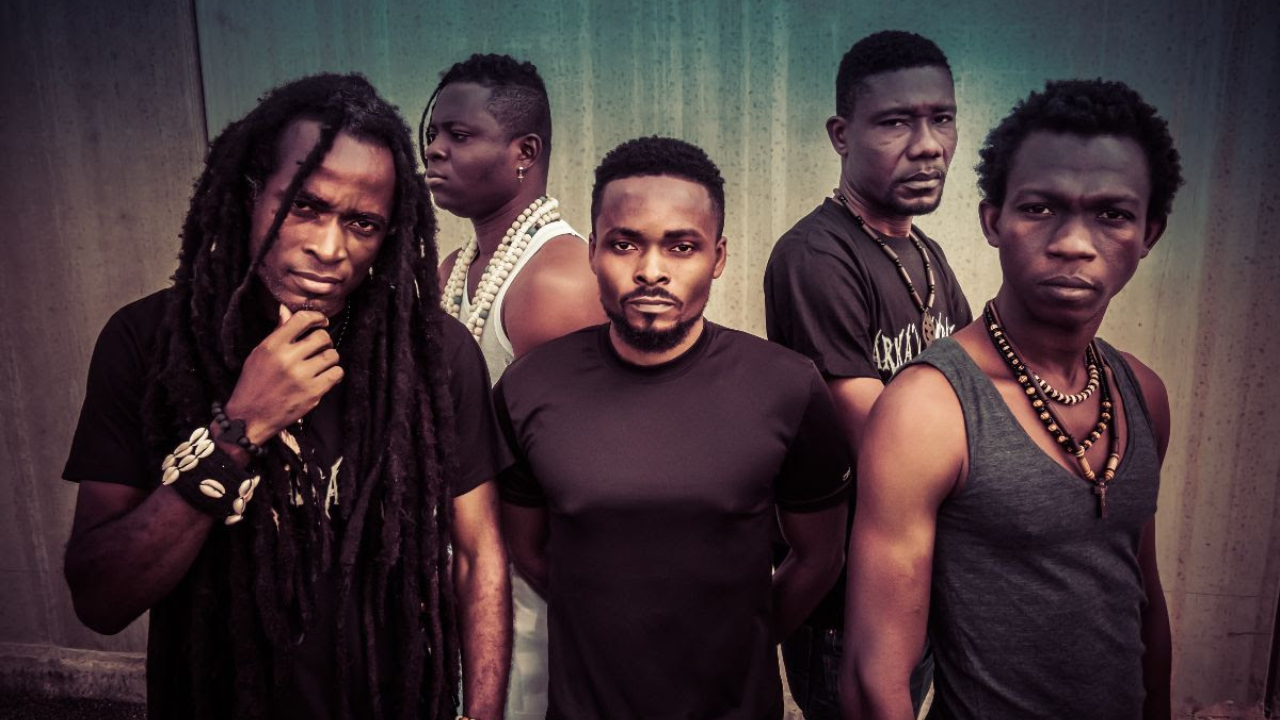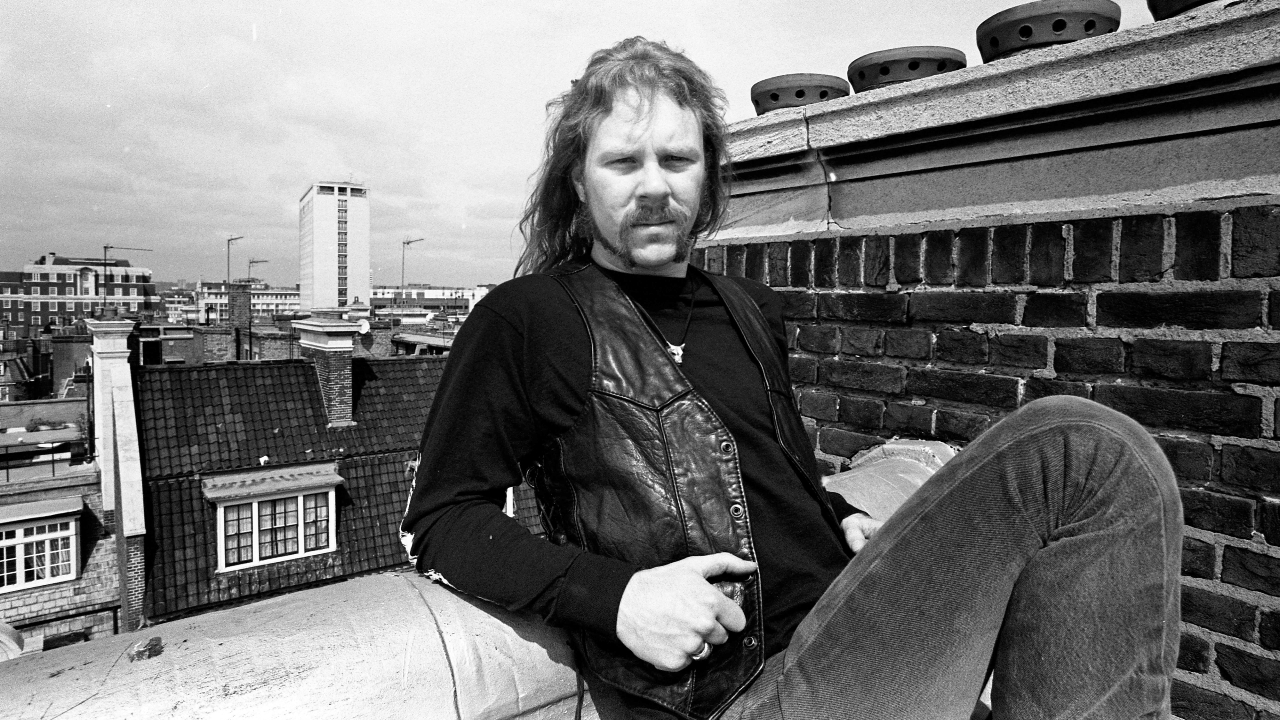"Africa is the future of metal." Meet Arka’n Asrafokor, Togo's first heavy metal band
Arka’n Asrafokor have had to travel 24 hours by bus just to be able to play gigs. Now, they're starting to get the recognition they deserve

"Africa is the future of metal." These are the words of Rock Ahavi, the singer, founder and chief songwriter with Arka’n Asrafokor, the electrifying metal band putting their home country of Togo on the map. Cocky? Maybe. But also a barometer for which way the wind is blowing. While all eyes have traditionally focused on Europe and America, Africa has become a hotbed of boundary-pushing bands and artists, from Kenya’s Lord Spikeheart, Morocco’s Taqbir and Zambia-born, Canada-based Backxwash to Botswana’s vibrant DIY scene, with its striking heavy metal cowboys.
Arka’n Asrafokor are in the vanguard of this New African Metal movement. Their second album, Dzikkuh, slams together groove, thrash and rap-metal with Togolese folk music. Their supercharged-tribal beats and chants give each song its own vibrant rhythm and thrilling, unique voice. “All the bands in Africa have something to say, and have their own power and message,” Rock says. “We’re just one part of the battle.”
He’s speaking to Hammer via Zoom from his home in Togo’s capital city, Lomé. He’s joined by his younger brother, Arka’n keyboardist/co-vocalist Elom ‘Enrico’ Ahavi, and their manager, Bea M-A. Rock jokes frequently but speaks with the deliberation of someone who doesn’t want his message to be misconstrued. English isn’t his first language, or even second – French is Togo’s ‘official’ language while the Ewe language is his own mother tongue. The Ewe people are Togo’s most populous ethnic group, and Rock and Enrico were raised in the culture’s traditions. “I don’t think I was even a day old when I heard my first [traditional Ewe] song!” says Rock. “It’s been with me my whole life.”
Rock’s passion for music is clear, his face lighting up even as he describes gruelling 24-hour bus trips to play gigs. The brothers grew up in a musical household, their parents playing everything from Dolly Parton to traditional Togolese folk.
“Our father would play classical music every morning at 5am!” Enrico says. “But music is everywhere in Togo. It’s rare to go somewhere you won’t hear a radio playing, people singing or drumming. It can be puzzling, going to Europe where places can be really calm and have no sound at all.”
Rock’s first instrument was keyboard, which he learned from his dad. As a child, he disliked playing the guitar – “I remember the pain I felt when I tried to play a chord” – but he had a lightbulb moment when he heard his first proper riff. “I was nine years old, washing up in the kitchen,” he recalls. “Led Zeppelin’s Whole Lotta Love came on the radio. I was just like, ‘Yes, this is my music! It did something to me physically.”
Metal wasn’t particularly popular in Togo, where the music scene was more dominated by pop, reggae and rap acts. Still, Rock got an education at the local market, listening to tapes of bands such as AC/DC and the Scorpions. When he moved to Lomé for university he graduated to nu metal and heavier music, eventually forming the first line-up of Arka’n Asrafokor in 2012. Then simply called Arka’n (a Ewe word to describe “things you see and feel outside your regular senses”, as Rock puts it), early shows would see them cover Enter Sandman and Killing In The Name, occasionally even a bit of Bob Marley.
Sign up below to get the latest from Metal Hammer, plus exclusive special offers, direct to your inbox!
“It was the best way to get my musician friends into rock and metal,” Rock admits. “Rock music fans were happy to listen to classic songs they knew and I was just happy to share their excitement and energy.”
At the same time, Enrico formed rap metal group H Weapons with their other brother, Tony. The latter even recruited Rock to play guitars on some of their songs. “It took years to do anything,” Enrico admits. “We didn’t have access to studios – our studio was in our bedroom, recording under the covers with the mattress pressed against a wall and the microphone secured underneath.”
The two bands fused in 2015 after the original line-up of Arka’n disbanded. Renaming themselves Arka’n Asrafokor – ‘Asrafo’ is Ewe for ‘warrior’, while ‘kor’ can mean ‘fist’ – Rock and Enrico expanded upon some of the traditional Ewe elements that had been part of their early sound, recruiting Yao Justin ‘Mass’ Aholou, a percussionist with a background in traditional Ewe folk music.
“After this part of Africa was colonised, the West decided to separate the region into all these countries like Togo, Ghana and Benin,” Rock explains. “They created artificial borders. The Ewe people can be found in all these places and what they have in common isn’t just music or culture, but a language. That’s why in almost all of Arka’n’s songs, we sing in the Ewe language.”
Ewe culture also manifests in the band’s lyrics and images. Songs like Angry God Of Earth and Walk With Us are centred around environmental concerns, spiritualism and triumphing over those who would hold us down. “It’s music for the battle!” Rock says with a grin. “It’s intense music, an expression of what you are and what you feel.”
With bassist Koffi Ametefe ‘Francis’ Amevo and drummer Komla Siko ‘Richard’ Tamakloe-Azamesu rounding out the line-up, Arka’n Asrafokor released their debut album, Zã Keli, in 2019 and celebrated with a huge release party in Lomé. “The venue was so full and we were on fire,” Rock recalls. “It felt like the audience were going to start a revolution.”
Arka’n Asrafokor’s new album, Dzikkuh, is more fired up and pissed off than its predecessor. While the skittering drum beats are still exciting, the guitars take on a much heavier and more aggressive tone while the music feels altogether tighter and more claustrophobic.
“The first album was almost a collection of all the things we were into,” Rock explains. “This one is a lot more defiant and about us being ourselves. There’s a lot more anger – ‘Dzikkuh’ means ‘anger’, but as in bringing back the people’s anger and rallying them around causes.”
“Our goal is to make people understand life,” Enrico adds. “Life isn’t only physical but spiritual, and people have to come to terms with that. What you do to others will come back to you. What you do to Mother Earth will come back to you. We want people to see the world not with their eyes, but with their hearts.”
While Arka’n Asrafokor are currently the only metal band in Togo, they remain optimistic about the wider scene. Frequently playing packed-out gigs at home in Lomé, they’ve also ventured outside of their homeland. In 2019, they travelled to Ghana to play the Africa Conference for Collaborations, Exchange and Showcases (ACCES) music event organised by non-profit initiative Music In Africa.
“We were last on and people had started leaving the venue because they’d seen the other bands,” Rock recalls. “Arka’n started and people ran back into the venue, packing it out. They came up to us afterwards like, ‘What was that?’ Because they’d never heard anything like it before. You’d see people headbanging next to others doing traditional African dances.”
It’s not just crowds in Africa responding that way. In the summer of 2022, the band played their first shows in Europe, touring in France. At one gig, Rock recalls, the crowd refused to leave at the end of their set. “The audience demanded an encore,” he says. “We came back on and played our last song again, and people left singing it without even needing to understand the lyrics. It was beautiful.”
A week before Arka’n started that French tour, Rock also achieved a lifelong goal when he saw Korn at Hellfest, more than 3,000 miles from home. He recalls the sheer elation as Jonathan Davis and co took to the stage. “It was my dream,” he says, beaming at the memory. “I’d listened to this music since I was a child, so finally getting to see those bands felt incredible. It was intense - I felt such a strong connection - it gave me more power because I want to be like them.”
As global metal continues to thrive, Arka’n hope it shines a light on more of the African metal scene. It’s a message they’ve been helping spread themselves. When US author Edward Banchs travelled to Togo to research his book, Scream For Me, Africa!, the band arranged for Ghanian group Dark Suburb to come to Lomé for a showcase. They’ve also taken part in an online festival organised by Botswana’s Overthrust, and have connections to other bands including Skinflint (also of Botswana) and even Brazil’s Black Pantera, putting the global metal idea into action. But Arka’n aren’t interested in positioning themselves as figureheads for African metal.
“We’d like to think if you’re listening to Arka’n in Germany, Massachusetts, Osaka or Buenos Aires, you’ll still think, ‘I can relate to this’,” Enrico says. “West Africa is really making itself heard right now. There are 1.6 billion people living on this continent. Arka’n is just one of those voices.”
DZIKKUH IS OUT NOW VIA REIGNING PHOENIX
Staff writer for Metal Hammer, Rich has never met a feature he didn't fancy, which is just as well when it comes to covering everything rock, punk and metal for both print and online, be it legendary events like Rock In Rio or Clash Of The Titans or seeking out exciting new bands like Nine Treasures, Jinjer and Sleep Token.


